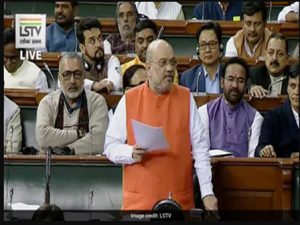OHCHR Petition in Indian Supreme Court on the CAA: Uncharted Usurpation by UN Body
OHCHR petition to participate as amicus curiae is not only the question of competence and accountability but also unquestionably an interference with the country’s internal affairs.

India’s Citizenship Amendment Act 2019 (CAA) has invited a lot of international attention, right from the stages of introduction of the amendment bill to the Shaheen Bagh protest for the withdrawal of the Act. Adding further ammunition to the discussions and criticisms for and against the Act, the UN body, Office of High Commissioner for Human Rights (OHCHR), filed an intervention petition in the Supreme Court of India. The petition, though filed under Supreme Court Rules Order XVI Rule 3, sought permission to ‘participate as amicus curiae’ in the proceedings that challenge the constitutional validity of the Amendment Act. The OHCHR petition is a carefully worded brief which explicitly states that: a) it is not an endorsement of the views of the original petitioners challenging the bill; b) the impugned Act has a “commendable purpose”; and c) the OHCHR only seeks to assist the court in examining the compatibility of the CAA with India’s Constitution. The OHCHR sought the court’s attention towards the persecution of the categories of persons excluded from the CAA, such as Ahmadi, Hazara and Shia Muslims.
The silent acceptance of this petition conveniently forgets that the High Commissioner can only comment on whether CAA is against the principles of International Law. The right forum to discuss the same is but different; the OHCHR might have approached the Committee on Civil and Political Rights. The filing of the amicus brief with an attempt to influence the examination of CAA’s compatibility with Indian Constitution is undoubtedly an interference with internal affairs of India. This has no acceptance in the current international law and the High Commissioner has acted beyond her capacity.
Also Read : Article 370 Has Its Pros And Cons Just Like Other Laws
The international community must be concerned that the High Commissioners and Special Rapporteurs, during the last decade, had filed such ‘amicus curiae briefs’ before various national and international judicial forums, without any specific mandate to do so.
While there is no comprehensive list of amicus curiae filings, it is possible to dig out information about 27 filings from the website of OHCHR, all of which are filed by Special Rapporteurs. The Refworld, a website maintained by UNHCR, gives 2 direct filings by the High Commissioner, both in European Court of Human Rights (another international body), in the years 2011 and 2015. An email to the OHCHR office requesting for the list of filings is still unanswered. At this point, only 14 of the total 29 filings collected by the author are in national courts. The OHCHR is trying to catalyze this evolving practice, despite the pertinent questions concerning legality. What does it mean to international law and global governance?
The special rapporteurs and the high commissioners use this innovative method of formal engagement with the States as a part of their mandate to conduct advocacy for the protection and promotion of Human Rights. The UNGA Resolution 48/141 (1993–94) is cited as a reference for this purpose; however, there is no explicit provision for the same in the Resolution 48/141. It is extremely unlikely that the States envisaged such a capacity to OHCHR. The texts of UN Resolutions, establishing UN bodies such as High Commissioners and other Special Rapporteurs, do not envisage any such power or function to intervene in the judicial proceedings within the states. The resolutions envisage four types of functionalities typically: a) information gathering and allied activities; b) identification and sharing of best practices; c) participation and the conduct of awareness programmes; and d) to report alleged violations of human rights to UNHRC or other relevant UN bodies.
The functionalities are always carefully worded such that the principles of the UN Charter and the international law limit the scope of the above officials. For example, when channels of inward communication are wide open to a variety of stakeholders, outward communications and reporting from OHCHR are limited to UNHRC, relevant international organizations and state parties. The mandate to engage in dialogue with governments must be considered as an assignment of a soft diplomatic task, and not a leeway to intervene in the judicial proceedings within the state.

The OHCHR document Human Rights in Action (HRA) explaining technical cooperation with governments limits its interaction with judicial systems to orientation and training programmes. According to the HRA, the special procedures such as rapporteurs, representatives and independent experts are allowed to submit an urgent appeal to the governments requesting clarifications, investigations and preventive measures. A capacity to engage in judicial proceedings is not envisaged therein. However, the Office Management Plan 2018–2021 of OHCHR contains an agenda to prepare guidelines for engaging with judicial proceedings as amicus curiae or expert witness. It is to be noted that this plan neither has the backing of the State Parties to the UN Charter nor is consistent with UNGA resolution establishing OHCHR.
The OHCHR is directed to function within the framework of the Charter of the United Nations and international law, which includes the obligations to respect the sovereignty, territorial integrity and domestic jurisdiction of States (UNGA Resolution 48/141, paragraph 3). The mandate under paragraph 4(f) requires the OHCHR to follow the Vienna Declaration and Programme of Action (PoA) 1993. Interestingly, the PoA with two detailed chapters on a) implementation and monitoring and b) cooperation, development and strengthening of human rights do not even speak of participating in the national judicial proceedings as a method.
The PoA further stipulates that assistance to national governments only on the basis of the active request of the nation-states. It cannot be assumed that the High Commissioner can suo motto apply to intervene in the judicial proceedings within in the state. Paragraph 7 of Section I of PoA mandates that all the processes undertaken by OHCHR should be consistent with the purposes and principles of the UN Charter and international law. The Article 2(7) of the Charter restricts the UN and its agencies from intervening in the domestic jurisdiction of any state. The acts of the High Commissioners and Rapporteurs, therefore, undermine the non-intervention principle of Article 2(7).
They are also in excess of authority since there has been no formal directive from any of the UN Charter bodies or Secretary-General for filing the intervening petitions.
Strictly speaking, the actions and responsibilities of the High Commissioner have to be within the framework of the overall competence, authority and decisions of the general assembly, economic and social council, and commission of human rights (UNGA Resolution 48/141, paragraph 4).
Also Read : Us Lawmakers Criticism Over Human Rights Violations In Kashmir
The studied silence on this subject matter is probably due to the fact that a substantial number of such applications were filed before international dispute settlement forums than national judicial bodies. Another plausible reason is that powerful nations see this as a diplomatic conduit for intervention in the internal affairs of the other nations without being necessarily challenged. The human rights defenders may also find prospects in the internationalization of human rights disputes and humanitarian concern. However, the acceptance of the practice without proper legal analysis and political deliberation will lead to less thought-out Global Governance 2.0, entrenching state–power disparities further deep.
The initial trends of global governance were promoted by circumventing the national authorities and reaching out to the local bodies within the nation-states for gathering information. The new trend is to push and pull the limbs of national governments by capturing judicial attention through feeding of information and expert opinions. The amicus curiae participation, on one hand, seems to be a friendly submission; on the other hand, it is an ‘intervention in the judicial affairs’, according to the standards of the contemporary international law.
In India, specifically, amicus curiae are legal counsels appointed by the court, when parties are not adequately represented (Supreme Court Rules (SCR) 2013 Order IV Rule 1). When a party uninvited by the Court files a petition, he/she is called an intervener and for all the purposes of the court, he/she is considered as a respondent (SCR 2013 Order I Rule 2(o)). In other words, the OHCHR application is indubitably an intervention application filed under the SCR 2013 Order XVII Rule 3 and OHCHR is an intervener, while the petition seeks self-characterize as amicus curiae brief. The difference in the characterization is not a mere technicality in the context of OHCHR’s disclaimer, which states the participation in the judicial proceedings is not a waiver, implied or explicit, of the privileges and immunities of the UN and its officials pursuant to international law. The disclaimer is also seen to be a general practice in all the 29 filings studied.
The new trend, therefore, both in theory and practice, is an uncharted usurpation of legal capacity by international agencies without any accountability. Any attempt to introduce customary international law status to the OHCHR’s practice must be challenged citing the impropriety of practice. If not, a practice without theory, an action without a legal framework and global governance without accountability will ensue. It is important that the international community build reliable and unfailing mechanisms before bestowing international organisations with such capacities and functions.
